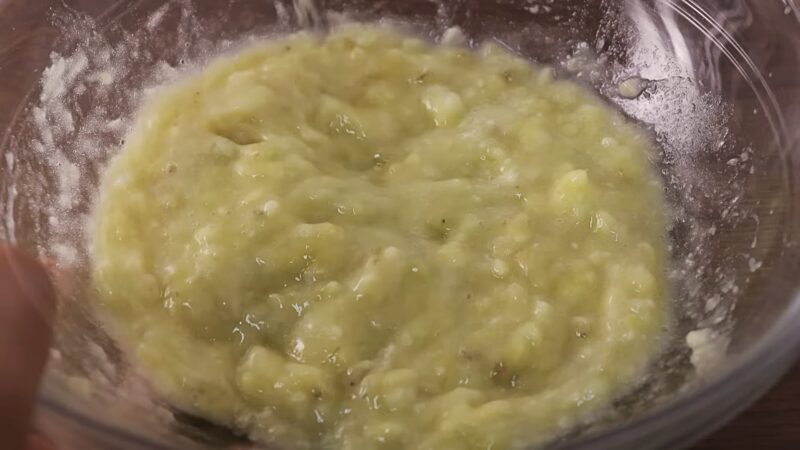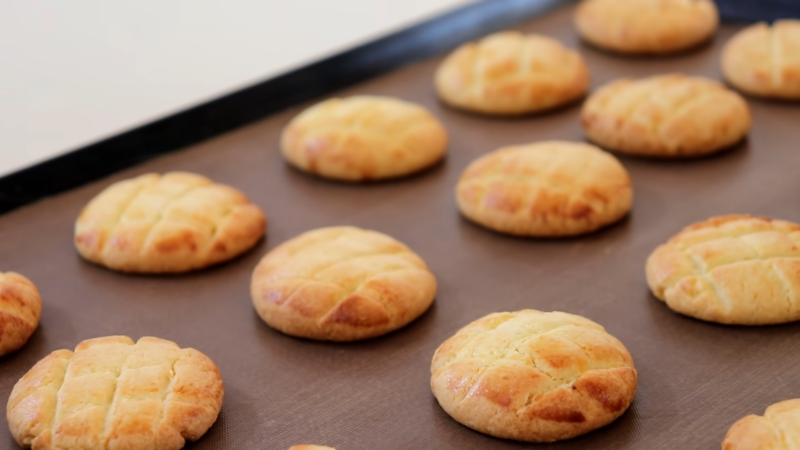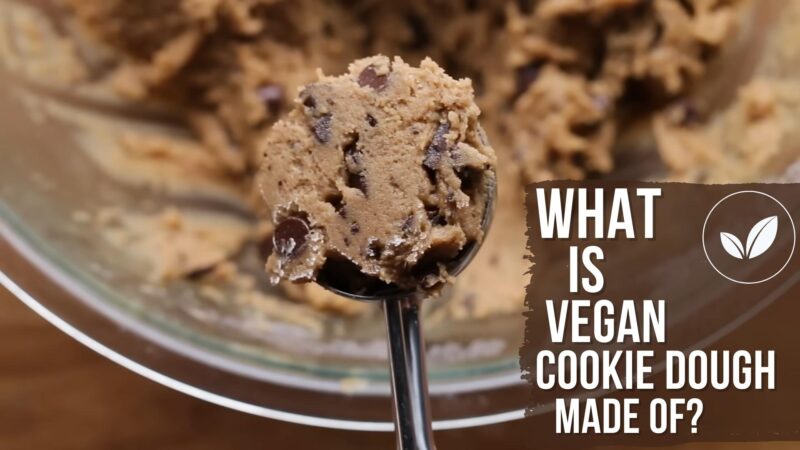The world of baking has been transformed with the increasing popularity of vegan diets, and an essential player in this shift has been the emergence of vegan cookie dough. But what exactly is vegan cookie dough, and what makes it different from traditional cookie dough? Let’s explore.
Before get into the core topic, it’s essential to understand veganism. Veganism is a lifestyle choice that involves avoiding all forms of animal exploitation and cruelty, which extends to food, clothing, or any other purpose.
A vegan diet is plant-based and excludes all animal products, including meat, dairy, eggs, and honey.
Classic cookie dough is primarily composed of flour, sugar, eggs, and butter. The eggs and butter provide moisture, fat, and binding, while the sugar sweetens, and the flour provides structure.
With vegan cookie dough, the challenge lies in finding plant-based substitutes that can fulfill the same functions as these animal-derived ingredients.
Key Ingredients of Vegan Cookie Dough

Now that we have established a basis, let’s explore the primary ingredients that make up vegan cookie dough and how they work together to create a delightful treat.
Flour
Like traditional cookies, the base of vegan cookie dough is still flour. However, the choice of flour can vary depending on dietary preferences or nutritional goals.
All-purpose flour is a common choice, but whole wheat, almond, oat, or even gluten-free blends can be used for added nutrition or dietary needs.
Sweeteners
As with any cookie dough, vegan cookie dough requires a sweetening agent. Granulated sugar, brown sugar, coconut sugar, and maple syrup are some common vegan-friendly choices. Agave nectar and date syrup can also be used, although they may alter the dough’s consistency and baking time.
Fats
Butter, a mainstay in traditional cookie dough, needs a substitute in vegan cookie dough. Many vegan bakers turn to plant-based butters or oils such as coconut oil, avocado oil, or even olive oil. Some recipes call for nut butters like almond or cashew, adding another layer of flavor.
Binding Agents

Eggs serve as a binding agent in traditional cookie dough, giving the dough its structure. In vegan cookie dough, this role is filled by alternatives such as flaxseed meal, chia seeds, applesauce, or mashed bananas. These “egg replacements” help bind the dough and provide moisture.
Flavorings
This is where creativity can truly shine in vegan cookie dough. From traditional vanilla extract to spices like cinnamon or nutmeg, the choices are endless. And let’s not forget the all-important chocolate chips – many companies now produce dairy-free versions for our vegan friends.
Now that we’ve understood the building blocks of vegan cookie dough let’s look at some simple yet delicious vegan cookie recipes that you can make at home.
Vegan Chocolate Chip Cookies
Ingredients:
- 2 cups all-purpose flour
- 1 teaspoon baking soda
- 1/4 teaspoon salt
- 1 cup vegan butter
- 1/2 cup granulated sugar
- 1/2 cup brown sugar
- 1 teaspoon vanilla extract
- 2 tablespoons flaxseed meal mixed with 6 tablespoons water (flax “eggs”)
- 1 1/2 cups vegan chocolate chips
Instructions:

- Preheat your oven to 350°F (175°C) and line a baking sheet with parchment paper.
- In a bowl, mix the flour, baking soda, and salt.
- In a separate bowl, cream together the vegan butter, granulated sugar, and brown sugar until smooth.
- Stir in the vanilla extract and flax “eggs” into the butter and sugar mixture.
- Gradually add the dry ingredients to the wet ingredients, stirring until a dough forms.
- Fold in the chocolate chips.
- Use a cookie scoop to drop portions of dough onto the prepared baking sheet.
- Bake for 10-12 minutes or until golden.
- Allow the cookies to cool on the baking sheet for 5 minutes before transferring to a wire rack to cool completely.
Gluten-Free Vegan Almond Cookies
Ingredients:
- 2 cups almond flour
- 1/4 teaspoon baking soda
- 1/4 teaspoon salt
- 1/3 cup maple syrup
- 2 teaspoons vanilla extract
- 1/2 cup almond butter
Instructions:

- Preheat your oven to 350°F (175°C) and line a baking sheet with parchment paper.
- In a bowl, combine the almond flour, baking soda, and salt.
- In another bowl, whisk together the maple syrup, vanilla extract, and almond butter until smooth.
- Gradually add the dry ingredients to the wet ingredients, stirring until a dough forms.
- Use a cookie scoop to drop portions of dough onto the prepared baking sheet, then flatten slightly with your hand.
- Bake for 10-12 minutes or until lightly golden.
- Allow the cookies to cool on the baking sheet for 10 minutes before transferring to a wire rack to cool completely.
Baking is a science, but within its structure, there is room for creativity and personal preference. Understanding the role of each ingredient in vegan cookie dough is the first step in creating your own custom vegan cookies.
Whether you’re a vegan, have dietary restrictions, or just enjoy trying new recipes, these vegan cookie dough basics will help you on your baking journey. Remember, the best part about making cookies is that you can taste as you go – and with vegan cookie dough, you can do so without any worry!
FAQs

Can I freeze vegan cookie dough for later use?
Absolutely! Vegan cookie dough can be frozen just like traditional cookie dough. To freeze, portion the dough into individual cookie sizes, place them on a baking sheet and freeze.
Once frozen, transfer the dough balls to a freezer-safe bag or container. They can be kept for up to 3 months. When you’re ready to bake, just add a couple of extra minutes to the baking time; there’s no need to thaw.
Can I use any type of flour for my vegan cookie dough?
You can certainly experiment with various types of flour. However, keep in mind that different flours have different properties and can change the texture and flavor of your cookies.
For instance, coconut flour is highly absorbent and may require additional liquid ingredients, while almond flour can give your cookies a nutty flavor and a dense texture.
Is store-bought vegan cookie dough safe to eat raw?
Most store-bought vegan cookie dough is safe to eat raw as it typically doesn’t contain any raw animal products, like eggs, which can cause foodborne illnesses. However, it’s always important to check the packaging for specific instructions and warnings.
I’ve heard that some sugars are not vegan. What kind of sugar can I use in vegan cookie dough?
Some sugars, especially certain brands of white and brown sugar, are processed using bone char, which is not vegan. When shopping for sugar for your vegan cookies, look for products labeled as vegan or organic. Organic sugars are not processed with bone char.
Can I use baking powder instead of baking soda in my vegan cookies?
Baking soda and baking powder are both leavening agents, but they are not always interchangeable. Baking soda is stronger and needs an acidic ingredient to activate it. Baking powder, on the other hand, already contains an acid and only requires moisture.
If you replace baking soda with baking powder, you’ll need about three times the amount of baking powder. However, this could affect the taste and texture of your cookies.
I don’t have flaxseed for making a flax “egg”. What else can I use?
There are many alternatives for flax “eggs” in vegan baking. Chia seeds can be used in the same way as flax seeds by mixing them with water. Unsweetened applesauce, mashed bananas, and commercially available egg replacers are also great options.
For each egg in a recipe, you can use 1/4 cup of pureed fruit or the equivalent amount of commercial egg replacer.
Conclusion
In conclusion, the world of vegan baking is a fascinating and rewarding domain that marries the magic of traditional baking with the principles of plant-based nutrition.
Creating vegan cookie dough, as we’ve seen, is an exercise in understanding the role of each component, sourcing appropriate vegan alternatives, and combining them to form a dough that not only respects vegan principles but is just as delicious as traditional cookie dough.
Beyond the science and the process, vegan baking is about inclusivity. It allows those with dietary restrictions or lifestyle choices to enjoy the simple, universal pleasure of a freshly baked cookie.
So, whether you’re an experienced vegan baker or a curious beginner, I hope this guide has inspired you to roll up your sleeves and start creating your own vegan cookie masterpieces. Remember, the beauty of baking lies in experimentation. Feel free to mix, match, substitute, and most importantly, taste as you go along. Happy baking!

